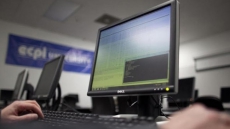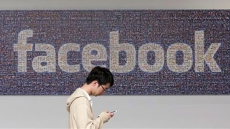OAKLAND, Calif. — IBM has engineered a way for everyone to join the fight against Ebola — by donating processing time on their personal computers, phones or tablets to researchers.
IBM has teamed with scientists at Scripps Research Institute in southern California on a project that aims to combine the power of thousands of small computers, to each attack tiny pieces of a larger medical puzzle that might otherwise require a supercomputer to solve.
"This could let us do in months what it would otherwise take years and years to do," said Erica Ollmann Saphire, a biomedical researcher at Scripps.
The idea isn't new: Several universities and research institutes have used so-called distributed computing to tackle complex problems. For the last 10 years IBM has sponsored a project called World Community Grid, in which volunteers agree to download software that takes advantage of unused processing capacity on their devices. About 680,000 individuals in 80 countries have enrolled in the IBM program, said IBM vice-president Stan Litow. They've donated computing power to help scientists at several institutions conduct research into malaria, AIDS, cancer and environmental issues.
The free downloadable software, available at www.worldcommunitygrid.org, works on Windows or Mac computers and Android mobile devices, although not Apple Inc.'s iPhone or iPad. Litow said it's designed to only use idle capacity when a device is connected to the Internet. Otherwise it isn't in use, so it won't slow other functions. On mobile devices, the program only works when the device is charging and connected to Wi-Fi, to avoid draining batteries or running up wireless charges.
Users can choose when their device connects to the grid network and whether it should happen automatically, Litow said. IBM also promises to respect volunteers' privacy and says the software can't access or alter any other files on a device.
The grid computing program breaks down large computing problems into thousands of smaller tasks, assigns them to individual devices and then compiles the results. Volunteers can get progress reports on each project, and IBM promises to make the resulting data available to any interested researcher.
Saphire, a microbiologist who has been working on Ebola research for 11 years, said the grid project will help with two problems. She's identified vulnerable sections of the Ebola molecule, but needs help analyzing various compounds to see which might be effective in attacking the virus at those spots. She's also working on a longer-term effort to understand how Ebola proteins change shape over time.
Commercial drug companies haven't been focused on diseases like Ebola, which mostly afflict less-developed countries, Saphire said. And with federal grant budgets shrinking, she's used crowd-funding websites to raise money for lab equipment and researchers' salaries.
"Crowd funding and crowd science gives people the opportunity to invest their idle computer hours or their ten bucks, and make a difference," she said.
International Business Machines Corp., based in Armonk, New York, joins other tech companies in the Ebola effort. Facebook and Google have both made appeals to their users to contribute to overseas Ebola relief. Google has matched user donations, while Facebook CEO Mark Zuckerberg personally donated $25 million to the effort.




